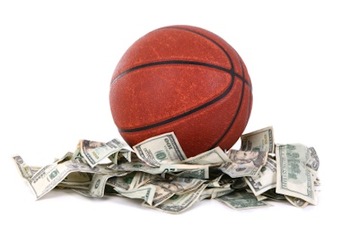What if, just before tip-off for this year's Final Four, the athletes simply walked off the court?You might ask, why in the world would college basketball players walk off the court at what is arguably the most watched, most lucrative and most celebrated college sporting event of the year? The simple reason is that college athletes participate in this process with no compensation other than tuition and associated benefits, while coaches, NCAA officials, corporations and television, among others rake in big busks that would not be possible without the athletes participating. Obviously.
What if the athletes demanded a greater slice of the pie for their efforts? Fram and Frampton explain that the legal standing of a work stoppage would fall under US federal and state labor laws:
[T]he case for college athletes' employee status is strong. Their labor and talent generate huge revenues for universities, just like the services rendered by professional athletes. School officials directly control their labor, and indeed, exercise a degree of oversight over players' lives far exceeding that of most employees. And, as opponents of paying college athletes invariably highlight, players already earn valuable compensation (in the form of scholarships) in return. Finally, nobody would assert that playing big-time college sports, like serving as a graduate teaching assistant, is a prerequisite for an academic degree.Fram and Frampton explore the issue of unionization in more depth in a recent law review paper (available here) in which they argue:
But federal labor law only applies to private universities. College athletes at public universities would be subject to state labor law, which has traditionally been far more favorable to student-employees. In at least a dozen states, including many with major college athletics programs (e.g., Florida, Michigan, Nebraska, Oregon), student-employees have long enjoyed the right to unionize. Undergraduates in several of these states have already successfully organized, forming unions of dining-hall workers, clerical assistants or dormitory advisers. If an undergraduate student assigned to answer phones in the athletics department qualifies as a union-eligible employee, why shouldn't a classmate whose scholarship requires him to compete weekly before 110,000 paying spectators?
This Article offers the first comprehensive analysis of NCAA athletics under state labor law, reaching a novel and potentially gamechanging conclusion: that Division I athletes at many top-ranked programs likely enjoy a legal right to unionize under state law.The focus on state labor laws is what distinguish the Fram and Frampton analysis from other analyses of the labor status of college athletes which has focused on federal law (such as McCormick and McKormick).
While the prospect of unionization accompanied by a labor stoppage is dramatic, I would argue that universities are already exposed to legal action under intellectual property policies currently in place.
Consider, for instance, the case of Ohio State a finalist in this year's Final Four, which says this about intellectual property:
Intellectual property describes a wide variety of property created by musicians, authors, artists, and inventors. The law of intellectual property typically encompasses the areas of copyright, patent, and trademark law. It is designed to encourage the development of art, science, and information by granting certain property rights to all artists, which include inventors in both the arts and the sciences.Is an athlete's name, likeness, image or other characteristics intellectual property? I'd think that a strong case can be made that it is. If such intellectual property has value, then who is allowed to benefit? Again, here is what OSU says:
Ownership of IP created through research at the University is determined by state law, federal law, University policy and by contract. Ohio Revised Code § 3345.14 provides in part that all rights to and interests in discoveries, inventions, or patents which result from research or investigation conducted in any experiment station, bureau, laboratory, research facility, or other facility of any state college or university, or by employees of any state college or university acting within the scope of their employment or with funding, equipment, or infrastructure provided by or through any state college or university, shall be the sole property of that college or university.As is common at university's including my own, the university retains ownership rights, but what about revenues that result? OSU has a revenue sharing formula:
Under the current formula, the inventor receives one-half of the first $75,000 of gross royalties and one-third of all subsequent royalties less patenting expensesThere are of course a number of issues involved with the notion of considering athletes under intellectual property policies. No doubt the fine details would have to be adjudicated. But given that IP protection is extended to artists and other university employees who do not perform conventional research resulting with inventions, it is at least plausible that IP from athletics, as a core university activity, would be judged to be covered by existing IP policies.
- The remaining portion of the royalties is shared by the Office of Research and the inventor’s college and department
- Royalties will be split equally among OSU joint inventors unless the inventors agree to a different allocation
Regardless, imagine if under the OSU intellectual property policies, star player Jared Sullinger agreed to license his image to, say, Gatorade for the next week for $500,000. Under the current OSU revenue sharing formula Sullinger would get about $145,000 and OSU would get $355,000 (hey, forget about exploited athletes, what about exploited professors?! ;-). This formula is so beneficial to universities that one might wonder why universities with big time athletic programs aren't already in a rush to capitalize on the untapped value of their highly visible athletes.
Of course, once universities step on that slippery slope they would find that the athletes hold all of the negotiating power, and that formula would change in a hurry. But make no mistake, as Fram and Frampton indicate, the issue of college athletes as employees has a long history, but really, debate has only just begun.




0 comments:
Post a Comment